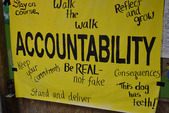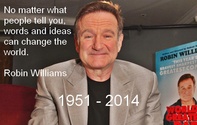Imagemakers International
Are you a Genuine Leader? If you want to attract and engage the best talent, improve performance and optimize results, it should come as no surprise that it all begins and ends with leadership. What may be surprising to many, however, is that leadership in the 21st Century is no longer just about rank, title or position. Instead, it's about knowing who you are, the values you uphold and the impact your actions will have on the lives of others. As we see it then, everyone has the opportunity to be a leader and the need for genuine leaders, has never been greater. To help people on that path, we’ve come up with a checklist that helps to define what a genuine leader is. Why not see how well you fare? A genuine leader is someone who:
So, are you a genuine leader? Take a moment to acknowledge the leadership qualities that are within you and those that you may need to work on. When you do, you will be well on your way to becoming a genuine leader and the kind of person others are inspired to emulate. ©2014 Kimberley Whiten-Richardson - Imagemakers International. All rights reserved.
1 Comment
The passing of Robin Williams has evoked many feelings and sentiments and I find myself trying to understand why? I never knew him as a person, didn't follow him as a comic, but I do remember that when he entered my world as Mork, he made me laugh - a lot. And now, for many reasons, I am experiencing a deep sense of loss.
Like so many others, I've found myself searching for answers and wondering how a man with such extraordinary wit, brilliance, success and love, could leave this world as he did. Yes I know that I’m not the first to ask that question, but my desire to attempt to answer it for myself, is important. Over the past week, we've all come to hear about the deep and dark places his mind took him to. Places where he was left feeling alone, afraid, anxious and fearful. We’ve also learned that he suffered deeply from depression and was in the initial stages of Parkinson’s – a debilitating disease that impacts the nervous system and the mind, ultimately leaving the person incoherent and deprived of their essence. But why we ask, would he end his life? Aren't there other celebrities like Michael J. Fox, who turned their diagnosis into a triumph – increasing awareness, moving forward and inspiring research into this disease? Why couldn't he have done the same thing? Perhaps the answers lie in the fact that Robin's essence was his genius, wit and unquenchable desire to make people laugh. That was his raison d’etre. His reason to be. So maybe there is a possibility that the thought of no longer being able to be himself, was essentially life threatening to him. And before the disease would take him, he would claim his life so that "who he was" could and would, remain in tact. And now, everyone who knew him personally and those of us who didn't, have been forced into a state of reflection, grieving the loss of the joy, laughter and inspiration he gave us - remembering him just as he was. And remember him, we will. His passing has made me realize that one life can truly make a difference. His death has raised awareness of the power of depression and that no one is exempt. According to the America Foundation for Suicide Prevention, on the evening of Robin's death – they received the highest number of calls – in it's 27 year history. The upside to the downside of this tragic loss is that many lives were likely saved, awareness increased. Depression is a dark, dark place that its victims do not choose to venture to. It is almost always triggered in adolescence by the culmination of experiences, people and relationships that have left an indelible wound. Having being surrounded by this dark devil in my own family, I know for certain that people do not choose to go there. They encounter a feeling of hopelessness, fear and despair that consumes their life. And we must understand that words like, "get over it", "you have so much to live for" or "be grateful", though well intended, may diminish their spirit even more. As such, we must do our very best to be more sensitive and understanding and to take off the lens of judgement for "we judge because we’ve either been there or we haven’t been there yet."1 Yes, sadly this great comic and human being, has met a tragic ending. His mask removed, we are deeply saddened by what we now know and see. He made us laugh until we cried and now, wondering how anyone can fill that void. They can't and won't because he was truly one of a kind. We will mourn the loss of his genius, humour and humanity, but perhaps the loss of something even greater - the light of someone who gave us joy and brightened our lives. A man who saw the silliness in everyday happenings and made us laugh at ourselves. And now, in his passing, forcing us to think, look within and see the humour and the irony, in our own lives. If we are to keep his legacy alive, let us all have more compassion and understanding for one another. Let’s do our best to take life seriously, but not ourselves. Let us all strive to be kinder, more understanding, gentle, loving, forgiving and true to ourselves. And most importantly, let's strive to laugh more and often. Doing so, may just save another life – not the least of which, our own. May his beloved family and friends take comfort in knowing that he made a difference in so many people's lives and left a legacy of love and laughter that we can all be inspired to emulate. May his soul rest in peace. Nanu Nanu! 1. Footnote: Frank Raso 2013 Is Accountability the Key to Success? "Accountability is about taking responsibility for our thoughts, feelings and actions and in turn, igniting our potential." ~ Imagemakers International Over the past 18 years, the one question we've been often been asked is: "How do I get my people to be more accountable?" To answer that question, we would have to begin by asking their leaders how they actually define accountability. Having done so, the definition varies considerably from one person and one organization, to the next. So what does accountability really mean and is it the key to success? From our perspective, accountability is about taking responsibility for one's thoughts, feelings, actions and outcomes. It's about discovering who you are, building trust and cultivating respect and in turn, taking yourself and your life to a whole new level. Here are a few more insights, that may help you achieve those goals: 1. Recognize what being unaccountable vs accountable looks and sounds like People must appreciate that being accountable is not about fault or blame. Those who makes excuses or blame the past and/or other people for who they are and what they can and can not do, often see themselves as victims of circumstance. If you're someone who finds themselves asking questions like, "why do these things always happen to me?" or "who's to blame for this" or making a statement like, "it's not my fault that...", you may be living an unaccountable life . And if you are, you are holding yourself back from reaching your full potential. By contrast, when you do take responsibility for your life and your actions and become accountable, you take yourself to a much higher level. When adversity happens, begin instead to ask questions like, "what can I learn from this", "what can I do differently next time" or "what internal resources do I have to overcome this?" When you do, you become a victor rather than a victim and this is key to reaching your full potential, building self-respect and earning the respect of others. 2. Do your part to inspire a learning culture. The old school of leadership presented accountability from a fear-based perspective. ie. admitting a mistake meant "you're in trouble, you're wrong or worse case, you're next." How can anyone be inspired to learn from their mistakes when shame, embarrassment and a diminished human spirit is the outcome? Genuine leaders inspire a learning culture by approaching accountability from a much more human perspective. They help their people understand that making a mistake is not the end of the world, but rather an opportunity to learn and grow. The result: the individual's dignity is left intact, role models are created and innovation and creativity are unleashed. It only takes one person to set this example and when nurtured, it will begin to transform both the individual and the entire organization. 3. Bring out the best in others and reap the rewards. One of our seminar participants recently told us that he'd had ten executive assistants in as many years. What does that say about him? Well, it's not what you think. When a mistake was made, he encouraged them to acknowledge it and said, "Let's fix it, learn and move on." As a result of his actions, he brought out the best in others and helped his people shine and guess what? Each of them did move on - they were all promoted and in very short order. 4. Demonstrate personal accountability so that others can follow your lead. "Show me, don't tell me", was always one of my father's favourite expressions. Genuine leaders are wise to follow this advice and must lead by example. To be effective, they must ask themselves three important questions:
Learn more...Leadership Programs: ©2014 Kimberley Richardson - Imagemakers International. All rights reserved.  I can remember our encounter like it was yesterday. He looked up at me timidly, afraid to look me in the eye. In a trembling voice he asked, "Spare any change, ma'am?" I responded, "I'm so sorry Sir. I would love to, but unfortunately I don't have any." Smiling he said, "that's ok your acknowledgement is payment enough." With tears in my eyes, I walked away somewhat humbled by the gift he had given me. I made a mental note "to always carry some change" just in case I would see him or other people like him, again. During the Holiday Season, as we run from one place to another, we will pass people like this gentleman. Cold and hungry, they will persist in their request for change, from one person after another. Many will walk by, some will reach into their pockets and a precious few, will reach into their hearts. Those who fall into the latter category will be giving the gift of acknowledgement - that priceless gift that is wrapped up in kindness and tied with dignity. We have many leadership lessons to learn from our homeless people, not the least of which is humility. Here are a few more worth sharing: 1. Be compassionate: We must remember to not judge the homeless as "less than" or condemn them for being on the streets. There are stories upon stories of people who's lives were changed in an instant, by tragedy. People like the former executive of Shell Oil who's wife and daughters were killed in a car accident. Unable to cope with this terrible loss, he eventually lost everything and found himself on the street. He did not choose the street, his life circumstances placed him there. 2. Preserve their dignity: Though we've all heard stories about people who choose to live on the streets, far too often mental illness them there. With current stats of 1 out of 4 people suffering from mental illness, it's not surprising that those without a support system end up being homeless. We must strive to do our very best as human beings, to preserve their dignity and to treat them with respect. Those who do will be doubly rewarded. 3. Remember, there are great teachers and leaders amongst them: Closer to home, my Uncle Cliff was once an English teacher who taught at Forest Hill Collegiate and Upper Canada College in Toronto. After a series of difficult life circumstances, severe mental illness and hard times, he ended up on the street. He went on to create Poetry Canada Review, a newspaper of the heart reporting on what really matters. It was also the first newspaper where Canadian poets could post and share their work. He also published three poetry books and won several international awards. Sometimes people must hit rock bottom before their gifts are discovered. And so as we move forward with our gift giving, let's remember to have an open and humble heart. Let's do our best to take the time to acknowledge those less fortunate than ourselves. Let's strive to BE the change and honour our fellow human beings. And finally, let's always remember that every one is somebody's child. If we do, we will lift their spirits and ours, not only at Christmas, but always. Fellow leaders amongst us. Lead. Make a difference. Leave a legacy. |
Kimberley RichardsonKimberley is an inspirational speaker, seminar leader and executive coach. She inspires people to become genuine leaders and in turn, the kind of person others are inspired to emulate. Archives
October 2015
|

 RSS Feed
RSS Feed
